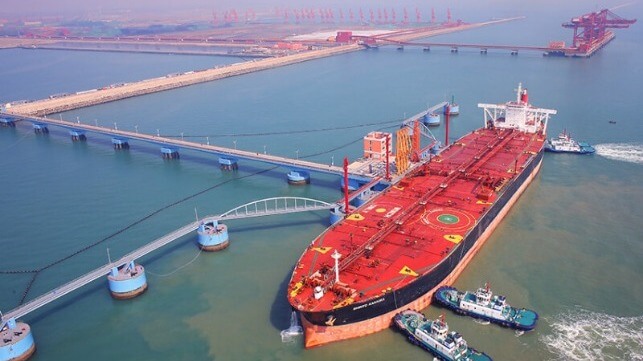Report: China’s Shandong Port Group to Turn Away US-Sanctioned Oil Tankers

China’s state-owned Shandong Port Group has reportedly announced a new policy for 2025 blocking tankers under U.S. sanctions from using its port facilities. Reuters released an exclusive report after traders shared copies of memos from the port regarding the new ban.
According to the memos shared with Reuters, Shandong Port Group “forbids ports to dock, unload or provide ship services to vessels on the Office of Foreign Assets Control list managed by the U.S. Department of State.”
An enforcement of the ban would mark a critical blow, especially to Iran which ships the majority of its oil to China. Last week, the NGO United Against a Nuclear Iran (UANI) cited data in its year-end report saying that Iran’s oil exports grew by 10.75 percent to 587 million barrels in 2024. China, it reported remains the largest destination and has grown its percentage of the trade receiving 533 million barrels, which UANI highlights is up 24 percent from 2023. China it said accounts for 91 percent of Iran’s total oil exports up from 83 percent in 2023.
Shandong Port Group is one of the leading port companies in China with operations at Yantai, Quingdao, Rizhao, and Bohai Bay Port. According to Reuters, at least eight large crude oil tankers, all under U.S. sanctions, docked at the group’s ports in December.
Highlighting the significance of the oil trade to China, Li Zhi, President of Dongming Petrochemical Group Co. spoke as part of the port group’s year-end presentation. He highlighted the group’s mission of ensuring national energy security and boosting regional economic development, by accelerating the construction of a safe, efficient, and smooth crude oil artery. Its crude oil imports Li reported account for more than a third of the country's total imports, and has developed into an important global energy supply chain hub.
Reuters says the group told traders the ban would have a small impact because most of the oil arrives on tankers not under the sanctions. However, UANI has called for increased sanctions by the West including an expanded focus on repeat offenders receiving oil in ship-to-ship transfers. Chinese tankers have frequently been cited as receiving oil in these transfers off ports such as Singapore and Indonesia.
Much of the sanctions have been targeted at the so-called shadow fleet servicing the Russian oil trade. The U.S. however has increased the sanctions on Iran in response to the instability in the Middle East and assertions that Iran is using the oil to fund its proxies including Hamas, Hezbollah, and the Houthis.
Analysts speculate China might have taken the move in a step as part of larger trade negotiations it hopes to have with the new Trump Administration. China is working to avoid Trump’s plans for sweeping tariffs.
No comments:
Post a Comment